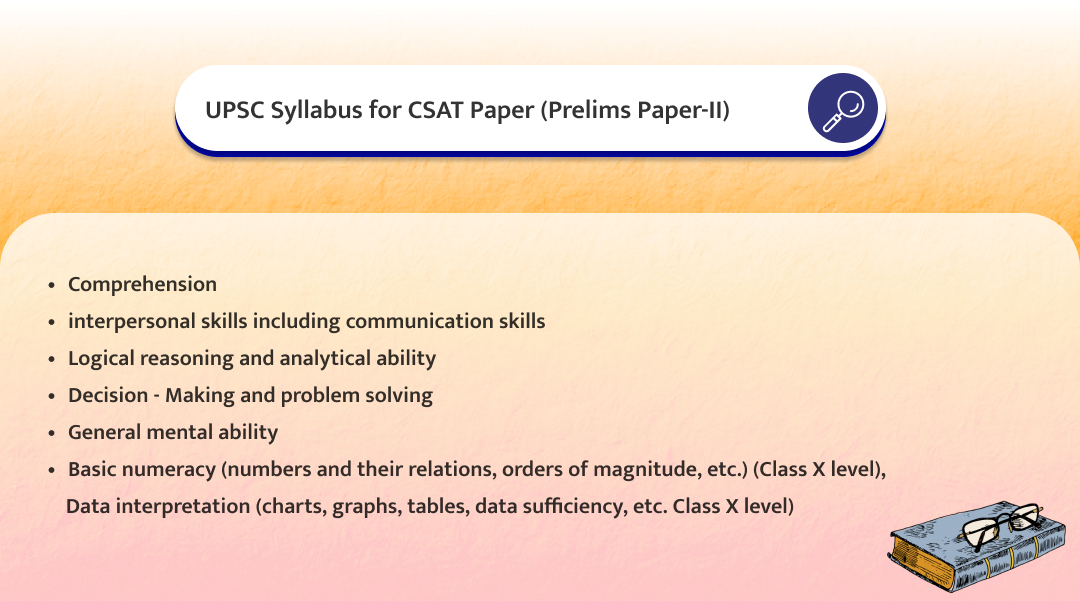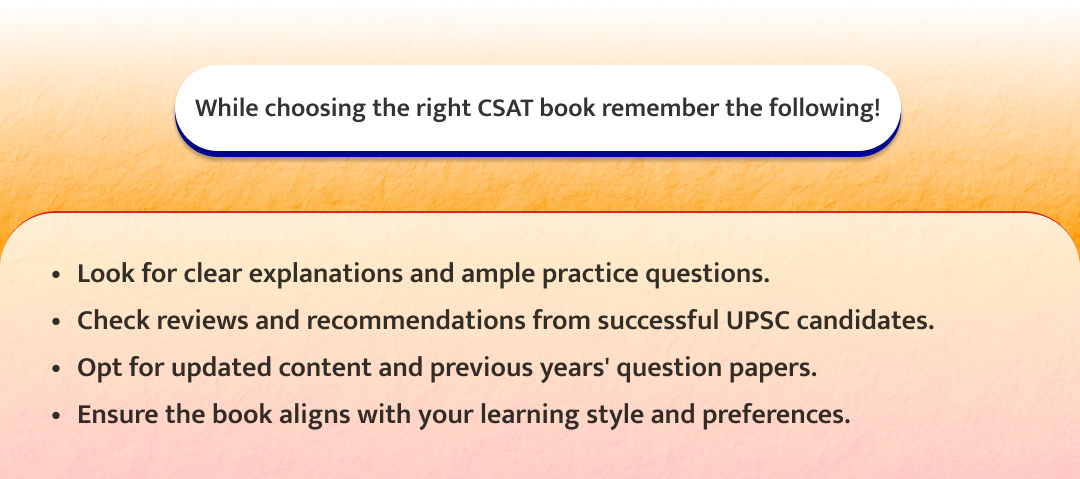The UPSC Civil Services Examination (CSE), popularly known as the IAS exam, is a rigorous national competitive test in India. It comprises three stages:
- Preliminary Exam: Consists of two papers (General Studies I and General Studies II) with multiple-choice questions. Marks from prelims qualify candidates for the main exam.
- Main Exam: A written exam covering subjects like history, geography, polity, economics, and environment.
- Interview (Personality Test): The final stage where candidates face a panel of experts.
The Civil Services Examination (CSE) conducted by the Union Public Service Commission (UPSC) is a rigorous and prestigious assessment that determines the future administrative leaders of our nation. While the General Studies (GS) paper garners significant attention, the Civil Services Aptitude Test (CSAT) plays an equally vital role. Because of following:
- Screening Mechanism: CSAT acts as a qualifying paper for the UPSC Prelims. It ensures that candidates possess basic aptitude skills necessary for administrative roles.
- Levelling the Field: CSAT balances the playing field by assessing logical reasoning, comprehension, and numeracy. It provides a fair chance to candidates from diverse backgrounds.
- Decision-Making Skills: The CSAT syllabus includes topics like decision-making and problem-solving. These skills are vital for effective governance and policy formulation.
Here is the list of topics as per UPSC for the CSAT Exam:

CSAT booklist for UPSC
NCERTs
NCERT books serve as a fundamental resource for UPSC Civil Services Exam preparation, especially for the CSAT (Civil Services Aptitude Test). These books provide a strong foundation of knowledge and concepts across various subjects. Let’s explore the relevant NCERT books for General Studies Paper-II (CSAT) those are must for csat booklist for upsc:
1: Class-IX NCERT for Maths
The Class 9th Maths book plays a significant role in CSAT (Civil Services Aptitude Test) preparation. It is choice of many aspirants and placed at number two in csat booklist for upsc. Let’s explore its importance:
Foundation of Numeracy Skills:
- The Class 9th Maths book provides a solid foundation for numeracy skills. CSAT evaluates candidates’ fundamental numeracy abilities, and a strong grasp of basic mathematical concepts is essential.
- Topics like arithmetic, algebra, and geometry covered in the Class 9th Maths syllabus contribute to building these skills.
Logical Reasoning:
- Logical reasoning is a crucial component of CSAT. The Class 9th Maths book introduces students to logical thinking and problem-solving techniques.
- Concepts like patterns, sequences, and mathematical reasoning enhance logical abilities, which are directly applicable to CSAT questions.
Comprehension and Decision-Making:
- The Class 9th Maths book involves reading and understanding mathematical concepts. This practice improves comprehension skills.
- In CSAT, candidates encounter comprehension passages. The ability to comprehend and make decisions based on information is vital.
Practice and Confidence:
- Solving problems from the Class 9th Maths book builds confidence. As candidates gain proficiency, they become more comfortable with mathematical reasoning.
- Regular practice with numerical problems sharpens analytical skills, which are valuable for CSAT.
Coverage of Essential Topics:
- The Class 9th Maths syllabus covers topics like number systems, polynomials, coordinate geometry, and statistics.
- These topics align with the CSAT syllabus, ensuring that candidates are well-prepared for the exam.
2: Class-X NCERT for Maths
The Class 10th Maths NCERT book is a valuable resource for preparing the CSAT exam and is the first choice of aspirants for their csat booklist for upsc. It is because of the following –
Comprehensive Coverage:
- The Class 10 Maths book covers essential topics such as real numbers, polynomials, quadratic equations, coordinate geometry, Data interpretation (charts, graphs, tables, data sufficiency, etc.
- It gives a foundation to Aspirants for mathematical concepts.
Logical Reasoning Development:
- The book introduces students to logical reasoning through various mathematical problems and exercises.
- Concepts like patterns, sequences, and mathematical reasoning enhance logical abilities.
Problem-Solving Practice:
- The book offers a wide range of illustrative problems and solutions.
- Regular practice with these problems sharpens analytical skills, which are valuable for CSAT.
Authentic Information:
- Written by subject experts, the book provides authentic information for all topics.
- It ensures that students have a clear understanding of mathematical concepts.
Preparation for Competitive Exams: It covers the entire syllabus and builds a strong foundation for competitive exams like UPSC.
Books for CSAT PYQs
PYQs: Analysing previous year question papers (PYQs) is a valuable strategy for UPSC CSE preparation. It helps to understand the exam pattern, identify topics of Outmost importance, and improve the problem-solving skills. Previous Year Question Papers (PYQs) hold immense significance in your UPSC Civil Services Examination (CSE) preparation. Below are some highly recommended books for UPSC CSAT preparation that compile previous years’ UPSC Prelims question papers:
Cracking the CSAT by Arihant Publication: The revised edition of “Cracking the CSAT Paper-2” by Arihant Publication is meticulously designed for UPSC Civil Services Preliminary Exam. One can consider this book to add in her/his csat booklist for upsc. Here are the highlights:
Structured Content:
- The book covers 8 major subject areas, aligning with UPSC’s competition level and pattern.
- It includes comprehension-based questions, graphs, charts, and tables with complete solutions.
Solved Papers:
- Previous years’ solved papers (2023-2020) help candidates understand the paper pattern.
- Solved papers for CSAT serve as valuable material for practice.
Thorough Practice:
- The book offers 5 comprehensive “Crack Sets” based on previous years’ papers.
- Aspirants can hone their skills and crack CSAT Paper 2 confidently.
Additional Books
Preparing for the UPSC CSAT (Civil Services Aptitude Test) is crucial for success in the preliminary stage of the UPSC (Union Public Service Commission) examination. The CSAT paper assesses your comprehension, logical reasoning, basic numeracy, and communication skills. Here are some highly recommended CSAT books that can help you prepare effectively:

A: Qualitative and Quantitative aptitude by RS Sharma:
The book “Quantitative Aptitude for Competitive Examination” by R.S. Aggarwal is a valuable resource for various competitive exams, including the Civil Services Aptitude Test (CSAT). It is considered my many Aspirants because of following:
Quantitative Aptitude:
- Topics Covered: The book comprehensively covers a wide range of quantitative topics, such as:
- Numbers: Understanding properties of numbers.
- Percentage: Calculating percentages and their applications.
- Profit and Loss: Analysing gains and losses.
- Interest: simple and compound.
- Mensuration: Dealing with geometric measurements.
- Trigonometry: Understanding trigonometric functions.
Importance for CSAT:
- Quantitative aptitude is essential for data interpretation, decision-making, and problem-solving in civil services.
- Scoring well in this section enhances overall performance in the CSAT paper.
- The book provides practice questions and concepts to strengthen quantitative skills.
Qualitative Aptitude:
- Topics Covered: While the book primarily focuses on quantitative aptitude, it indirectly contributes to qualitative aptitude by enhancing logical reasoning and critical thinking.
Importance for CSAT:
- Qualitative aptitude helps candidates analyze information, make informed decisions, and solve real-world problems.
- It is crucial for interpreting data and answering questions based on logical reasoning.
- Scoring well in qualitative aptitude contributes to overall success in the CSAT.
Preparation Tips:
- Practice puzzles and brain teasers.
- Analyse arguments and evaluate their validity.
- Develop critical thinking skills.
- Review previous years’ CSAT papers.
B: Analytical Reasoning by M.K. Pandey:
This book focuses on enhancing your analytical reasoning capabilities. It covers both logic-based and rule-based reasoning. Analytical Reasoning by M.K.
Pandey is a comprehensive book for CSAT that serves as a foundational resource for aspirants preparing for competitive exams. This book covers topics in two parts:
first is reasoning based on logic and second is reasoning based on rules. Part I covers topics such as assumptions, forcefulness of arguments, data sufficiency,
and cause and effects. Part II delves into syllogism, analytical decision-making, and input-output. With a fine balance between theory and practice, this book provides
ample practice questions, answers with explanations, and follows the latest exam patterns. It is a valuable book for CSAT preparation.
C: CSAT Manual by Pearson:
Provides practice questions for comprehension, logical reasoning, and mathematics. All questions come with solved answers and explanations. The Pearson CSAT Manual is a
comprehensive book for CSAT (Civil Services Aptitude Test), specifically General Studies Paper II. It covers both General Studies Paper I and Paper II. The book
emphasizes mathematical problems and reasoning, which can be challenging for many aspirants. Key features include lucid language, interactive explanations, and illustrative examples.
It’s a valuable resource for enhancing analytical reasoning skills and preparing for the CSAT paper. Remember, thorough preparation and the right study materials are essential
for success in the UPSC Prelims GS Paper 2
D: The Mantra of CSAT Paper II by Gautam Puri:
This book helps to build a strong foundation for the CSAT Paper and a resourceful book for CSAT. Covers topics related to decision-making, problem-solving, and general mental ability. The Mantra of CSAT Paper II by Gautam Puri is a commendable choice for CSAT (Civil Services Aptitude Test) preparation because-
- Comprehensive Coverage: The book meticulously covers the entire CSAT syllabus in a lucid style, ensuring a strong foundation for aspirants.
- Aptitude Guru’s Expertise: Prepared diligently by the ‘Aptitude Guru’ Gautam Puri, the book provides valuable insights and strategies for tackling CSAT questions effectively.
- Practice Exercises: A plethora of working exercises is provided after each chapter, allowing aspirants to polish their learning and enhance problem-solving skills.
- Solved Papers: The book includes solved papers from 2015 to 2019, giving aspirants a glimpse of actual exam patterns and helping them practice effectively.
E. General Studies Paper II for UPSC Preliminary Examination by Tata McGraw Hill:
This book for CSAT delivers high-quality questions covering the complete CSAT syllabus. It is also a valuable book for UPSC CSAT (Civil Services Aptitude Test) preparation because:
- Comprehensive Coverage: This book provides a thorough understanding of the topics covered in CSAT Paper II. It focuses on areas such as comprehension, logical reasoning, analytical ability, quantitative skills, data interpretation, decision-making, and interpersonal communication.
- Quality Practice Questions: The book includes practice exercises and comprehension passages similar to those encountered in the actual CSAT exam. It allows aspirants to hone their skills effectively.
- Solved Previous Year Papers: Aspirants benefit from solved question papers from previous years, helping them understand the exam pattern and improve their performance.
- Mathematical and Reasoning Skills: The book covers basic numeracy, logical reasoning, and analytical abilities, which are crucial for success in CSAT.
The CSAT is a crucial component of the Civil Services Examination (CSE) conducted by the Union Public Service Commission (UPSC) in India. It evaluates candidates’ aptitude, comprehension, and analytical abilities necessary for effective administration in civil service positions. To choose a right book for CSAT preparation is very important in the process and remember that regular practice with these books will build your confidence and reduce exam-day anxiety.